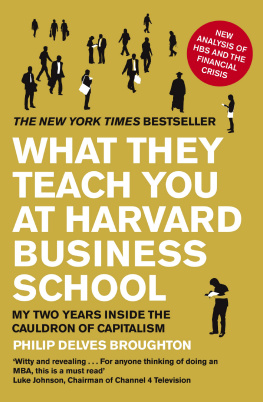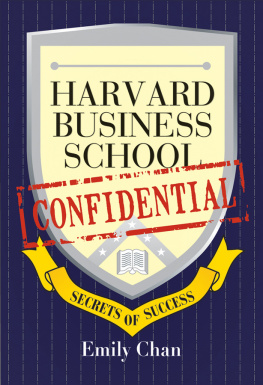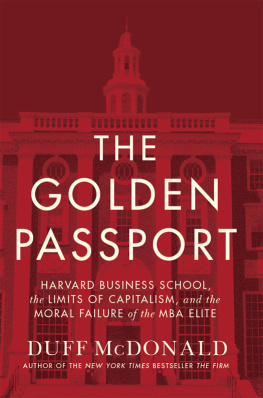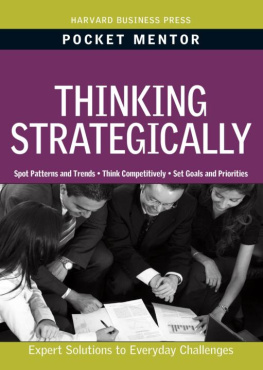ABOUT THE AUTHOR
Philip Delves Broughton was born in Bangladesh and grew up in England. He graduated from New College, Oxford, in 1994 and received his MBA from the Harvard Business School in 2006. From 19982004 he served, successively, as the New York and Paris bureau chief for the Daily Telegraph of London and reported widely from North and South America, Europe, and Africa. His work has appeared in newspapers and magazines around the world. He lives in Connecticut with his wife and two sons.
What They Teach You
at Harvard Business School
My Two Years Inside the
Cauldron of Capitalism
PHILIP DELVES BROUGHTON
VIKING
an imprint of
PENGUIN BOOKS
VIKING
Published by the Penguin Group
Penguin Books Ltd, 80 Strand, London WC2R 0RL , England
Penguin Group (USA) Inc., 375 Hudson Street, New York, New York 10014, USA
Penguin Group (Canada), 90 Eglinton Avenue East, Suite 700, Toronto, Ontario, Canada M4P 2Y3
(a division of Pearson Penguin Canada Inc.)
Penguin Ireland, 25 St Stephens Green, Dublin 2, Ireland (a division of Penguin Books Ltd)
Penguin Group (Australia), 250 Camberwell Road,
Camberwell, Victoria 3124, Australia (a division of Pearson Australia Group Pty Ltd)
Penguin Books India Pvt Ltd, 11 Community Centre,
Panchsheel Park, New Delhi 110 017, India
Penguin Group (NZ), 67 Apollo Drive, Rosedale, North Shore 0632, New Zealand
(a division of Pearson New Zealand Ltd)
Penguin Books (South Africa) (Pty) Ltd, 24 Sturdee Avenue,
Rosebank, Johannesburg 2196, South Africa
Penguin Books Ltd, Registered Offices: 80 Strand, London WC2R 0RL ., England
www.penguin.com
First published as Ahead of the Curve in the United States of America by The Penguin Press 2008
First published in Great Britain by Viking 2008
Reissued with a new Postscript 200g
Copyright Philip Delves Broughton, 2008, 2009
The moral right of the author has been asserted
All rights reserved
Without limiting the rights under copyright reserved above, no part of this publication may be reproduced, stored in or introduced into a retrieval system, or transmitted, in any form or by any means (electronic, mechanical, photocopying, recording or otherwise), without the prior written permission of both the copyright owner and the above publisher of this book
A CIP catalogue record for this book is available from the British Library
ISBN: 978-0-14-193132-6
For Margret
There are two types of education. One should teach us how to make a living and the other how to live.
J OHN A DAMS
CONTENTS
PREFACE
I did not go to Harvard Business School planning to write a book about the experience. In fact, after ten years as a journalist, I went there to recover from writing, to stop looking at the world around me as a source of potential stories. I wanted to learn about business in order to gain control of my own financial fate and, more important, my time. I was tired of living at the end of a cell phone, prey to an employers demands. A masters in business administration, I hoped, would be my path to greater knowledge about the workings of the world and broader choices about the life I might lead.
I say this only to make clear that this book was never intended as an inside raid. In many ways, I loved my two years at Harvard. My classmates were smart and considerate. The faculty was, for the most part, inspiring and committed. The facilities and the speakers who came to spend time with us were quite extraordinary. As a catbird seat for viewing capitalism, there is no better place. For me, and everyone I knew, Harvard changed the view of our futures and the possibilities available to us through business.
But it was an intense time, far more intense than Id ever imagined. The work load, especially in the first few weeks, was crushing as we struggled to learn the functional areas of business, finance, accounting, operations, marketing, and organizational behavior. As the months passed, the pressure to find jobs, the right jobs, became a separate education in itself, beyond what occurred in the classroom.
This book is my attempt to describe my experience and that of my classmates in this cauldron of capitalism. Reading through the diary I kept during my two years there, I was surprised by the emotions the experience drew out of me. I had expected a more neutral time at business school, a period of study and preparation for a different career. Instead, we MBA students spent much of our time discussing our ambitions and the kinds of lives we wanted for ourselves and our families. This debate looms large in the book, alongside accounts of what we learned in class, what the many famous speakers said, and how we went about deciding what to do for work. To have the opportunity to study at Harvard Business School is a great gift. Any gripes, criticisms, or anxieties I express should be taken for what they are: high-class problems.
In 1960, five thousand MBAs graduated from American universities. In 2000, the number had risen to a hundred thousand. The MBA course now comes in all kinds of flavors. There is the classic two-year, full-time residential course, which I took. But you can now study for an MBA part-time, online, at night, or in multiple international locations. Where capitalism goes, the MBA follows. The number of MBA applicants in the Middle East, China, and India is soaring. Survey after survey has shown that MBAs tend to receive higher salaries and better jobs. Those three precious letters have become a calling card, and in some cases a requirement, for success in business.
While I attended Harvard Business School (HBS, as I shall often refer to it), between 2004 and 2006, the schools alumni included the president of the United States, the secretary of the U.S. Treasury, the president of the World Bank, the mayor of New York City, not to mention the CEOs of General Electric, Goldman Sachs, and Procter and Gamble. HBS alumni filled 20 percent of the top three jobs at the Fortune 500 companies. The newly fashionable private equity and hedge fund industries were stacked with Harvard MBAs, who were received like gods when they returned to campus. It was daunting and thrilling to join such a powerful lineage.
The school believes that the kind of leadership required to succeed in business can also be applied to other spherespolitics, education, health care, the arts. I did not come from a business background and instinctively resisted this notion that businesspeople should be running everything. It was a question that came up repeatedly over the next two years, and it cuts to why a book on the Harvard MBA should be of interest to a broader audience than those who either have an MBA or are considering getting one. The language, practices, and leadership styles taught in the MBA course affect all of us. Business schools no longer produce just business leaders. MBAs determine the lives many of us will lead, the hours we work, the vacations we get, the culture we consume, the health care we receive, and the education provided to our children. Since 2000, the Harvard MBA in the Oval Office has made decisions of global and historical consequence. In short, the MBA, its content, and the network of people who hold it, matter. And it has ambitions to matter even more.
Finally, this book is just one persons view. No single MBA could ever be representative of the nine hundred students in the Harvard Business School class of 2006. Everything in this book occurred as I describe it. But I have altered the names and changed details to conceal the identities of some of my fellow students. I did this for two reasons. The first was privacy. The Harvard Business School classroom is a safe learning environment, a place to experiment and make mistakes. My classmates did not know that one day I would write a book about our experiences. While my own embarrassments and humiliations fill this book, theirs are their own concern. The second reason for concealing some identities is that it allows me to describe what we went through with greater honesty than if I had to worry about the reputations of people I like and admire. The professors, since their role as teachers is a public one, appear as they were, as do the speakers who came to campus. My intention in combining these approaches is to give as accurate a picture of my time at HBS as possible.
Next page





